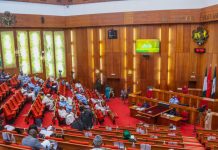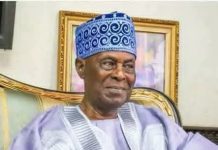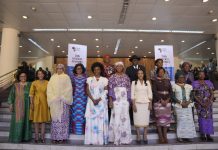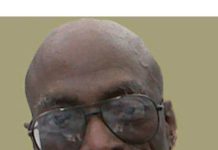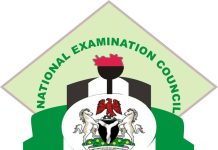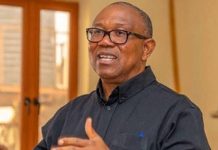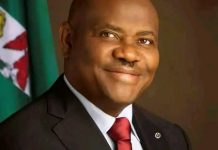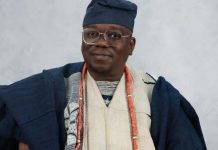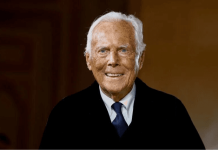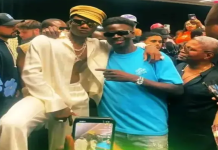Yahaya Bello Vs EFCC:
Court adjourns to June 26 fo ruling on Commission’s request to ‘cross-examine’ its witness
.You must first declare your witness hostile before cross-examination, says defendant’s counsel
The Federal High Court in Abuja has adjourned the hearing of the alleged money laundering case instituted against the immediate past Governor of Kogi State, Yahaya Bello, by the Economic and Financial Crimes Commission to June 26, 27 and July 4 and 5 for ruling on the request by the prosecution to “cross-examine” the 3rd witness and for continuation of trial.
Justice Emeka Nwite adjourned the hearing after listening to addresses by the prosecution and defence counsels on the Prosecution’s move to initially cross-examine the witness, a position that was rejected by the Defendant’s Counsel, Joseph Daudu, SAN.
When the matter was called for continuation of cross-examination, the Defendant’s counsel asked the witness, Nicholas Ojehomon, whether he had testified in other courts with respect to the issue of school fees paid by the Bello family to AISA, he said yes.
But the witness, an internal auditor at the American International School, Abuja, said he could not mention the exact courts.
He admitted testifying in a similar charge involving Ali Bello but added that he never said anything adversely against former Governor Yahaya Bello just as he had not said anything negative or adversely against him in the instant charge.
After Daudu SAN concluded the cross-examination of the witness, Nicholas Ojehomon, the EFCC’s lawyer, Kemi Pinheiro, SAN, moved to also cross-examine the Commission’s witness on Exhibit 19.
He told the court that he was not re-examining the EFCC’s witness, but cross-examining him because the document was admitted in evidence.
“I am not re-examining him, I am cross-examining him because they brought this document,” he said.
The Defendant’s lawyer, however, drew the court’s attention to the fact that the prosecution counsel’s position was unknown to law, in line with the Evidence Act.
“If you want to cross-examine your own witness, you have to first declare him a hostile witness. You cannot cross examine him based on the document,” Daudu SAN argued.
Pinheiro SAN added that he had the right to draw the attention of the court to some specific paragraphs in the document.
At this point, the judge asked: “Do you have any provision of the law to support this?”
“I will draw your lordship attention to Section 36 of the Constitution. They sought to tender this document, we objected and the court granted their prayer. Fair hearing demands that the complainant too has the right to examine this because Section 36 of the Constitution talks of fair hearing,” Pinheiro responded.
“We are not saying that they cannot re-examine the witness. That is what Section 36 under the law says about fair hearing. But if it is to cross-examine him, he will have to show us the law that backs that.
“He cannot come under the guise of fair hearing to want to cross-examine the witness,” the Defendant’s lawyer maintained.
The judge, at the end of the arguments, refused to allow cross-examination of the witness by the EFCC lawyer.
“Under the procedure, the witness gives evidence in chief and the defendant cross examines, then the prosecution re-examines.
“With due respect, what I will do is if you people are so skewed to continue with this, it is better to address me on thi
Yahaya Bello Vs EFCC: Court adjourns to June 26 for ruling on Commission’s request to ‘cross-examine’ its witness
…You must first declare your witness hostile before cross-examination – Defendant’s Counsel
The Federal High Court in Abuja has adjourned the hearing of the alleged money laundering case instituted against the immediate past Governor of Kogi State, Yahaya Bello, by the Economic and Financial Crimes Commission to June 26, 27 and July 4 and 5 for ruling on the request by the prosecution to “cross-examine” the 3rd witness and for continuation of trial.
Justice Emeka Nwite adjourned the hearing after listening to addresses by the prosecution and defence counsels on the Prosecution’s move to initially cross-examine the witness, a position that was rejected by the Defendant’s Counsel, Joseph Daudu, SAN.
When the matter was called for continuation of cross-examination, the Defendant’s counsel asked the witness, Nicholas Ojehomon, whether he had testified in other courts with respect to the issue of school fees paid by the Bello family to AISA, he said yes.
But the witness, an internal auditor at the American International School, Abuja, said he could not mention the exact courts.
He admitted testifying in a similar charge involving Ali Bello but added that he never said anything adversely against former Governor Yahaya Bello just as he had not said anything negative or adversely against him in the instant charge.
After Daudu SAN concluded the cross-examination of the witness, Nicholas Ojehomon, the EFCC’s lawyer, Olukayode Enitan, SAN, moved to also cross-examine the Commission’s witness on Exhibit 19.
He told the court that he was not re-examining the EFCC’s witness, but cross-examining him because the document was admitted in evidence.
“I am not re-examining him, I am cross-examining him because they brought this document,” he said.
The Defendant’s lawyer, however, drew the court’s attention to the fact that the prosecution counsel’s position was unknown to law, in line with the Evidence Act.
“If you want to cross-examine your own witness, you have to first declare him a hostile witness. You cannot cross examine him based on the document,” Daudu SAN argued.
Enitan SAN added that he had the right to draw the attention of the court to some specific paragraphs in the document.
At this point, the judge asked: “Do you have any provision of the law to support this?”
“I will draw your lordship attention to Section 36 of the Constitution. They sought to tender this document, we objected and the court granted their prayer. Fair hearing demands that the complainant too has the right to examine this because Section 36 of the Constitution talks of fair hearing,” Enitan responded.
“We are not saying that they cannot re-examine the witness. That is what Section 36 under the law says about fair hearing. But if it is to cross-examine him, he will have to show us the law that backs that.
“He cannot come under the guise of fair hearing to want to cross-examine the witness,” the Defendant’s lawyer maintained.
The judge, at the end of the arguments, refused to allow cross-examination of the witness by the EFCC lawyer.
“Under the procedure, the witness gives evidence in chief and the defendant cross examines, then the prosecution re-examines.
“With due respect, what I will do is if you people are so skewed to continue with this, it is better to address me on this and I will take a position,” he stated.
At this point, the prosecution counsel agreed to re-examine the EFCC’s witness and the judge gave him the go-ahead.
“You can re-examine him on that but not to ask questions that will show cross examination,” Justice Nwite said.
However, when the prosecution lawyer proceeded to re-examine the witness, and his questions pointed at cross-examination, as observed by Daudu SAN, the judge insisted that the parties had to address him on the specific issue.
The Defendant’s Counsel, in his address, maintained that the position was unknown to law.
“My lord, the procedure that is being sought by the prosecution by refering the witness to the document tender in Exhibit 19 and by asking him to read paragraph 1, without drawing his attention to the issue on how the document affected his evidence in chief, the question asked in cross-examination, and the ambiguity, which needs clarification, amounts to a strange and unknown procedure not covered by the Evidence Act,” he stated.
Enitan SAN, disagreed, saying that in the case of Amobi Amobi referred to by the defendant’s counsel, the Supreme Court held that the learned trial judge ought to have allowed a re-examination of Exhibit E.
He said when the defendant sought to introduce the document, the prosecution team “submitted that this document was not made by the witness and as such, he should not be allowed to speak to it under cross examination or allowed to be confronted with it.”
“Having brought it in now, during the case of the prosecution, particularly during the cross examination of PW-3, your lordship should not allow them to shut us out as that would amount to the court allowing them to blow hot and cold,” Pinheiro SAN said.
Justice Nwite thereafter adjourned to June 26, 27 and July 4 and 5 for ruling and continuation of trial.
The 3rd prosecution witness had, at the last hearing on Thursday, said there was no wired transfer of fees from the Kogi State Government or any of the local Governments in the state to the account of the American International School, Abuja.
He also read out a part of a previous Federal Capital Territory High Court judgment that said there was no court order for AISA to return fees to EFCC or any judgment declaring the money as proceeds of money laundering
Yahaya Bello Vs EFCC: Court adjourns to June 26 for ruling on Commission’s request to ‘cross-examine’ its witness
…You must first declare your witness hostile before cross-examination – Defendant’s Counsel
The Federal High Court in Abuja has adjourned the hearing of the alleged money laundering case instituted against the immediate past Governor of Kogi State, Yahaya Bello, by the Economic and Financial Crimes Commission to June 26, 27 and July 4 and 5 for ruling on the request by the prosecution to “cross-examine” the 3rd witness and for continuation of trial.
Justice Emeka Nwite adjourned the hearing after listening to addresses by the prosecution and defence counsels on the Prosecution’s move to initially cross-examine the witness, a position that was rejected by the Defendant’s Counsel, Joseph Daudu, SAN.
When the matter was called for continuation of cross-examination, the Defendant’s counsel asked the witness, Nicholas Ojehomon, whether he had testified in other courts with respect to the issue of school fees paid by the Bello family to AISA, he said yes.
But the witness, an internal auditor at the American International School, Abuja, said he could not mention the exact courts.
He admitted testifying in a similar charge involving Ali Bello but added that he never said anything adversely against former Governor Yahaya Bello just as he had not said anything negative or adversely against him in the instant charge.
After Daudu SAN concluded the cross-examination of the witness, Nicholas Ojehomon, the EFCC’s lawyer, Olukayode Enitan, SAN, moved to also cross-examine the Commission’s witness on Exhibit 19.
He told the court that he was not re-examining the EFCC’s witness, but cross-examining him because the document was admitted in evidence.
“I am not re-examining him, I am cross-examining him because they brought this document,” he said.
The Defendant’s lawyer, however, drew the court’s attention to the fact that the prosecution counsel’s position was unknown to law, in line with the Evidence Act.
“If you want to cross-examine your own witness, you have to first declare him a hostile witness. You cannot cross examine him based on the document,” Daudu SAN argued.
Enitan SAN added that he had the right to draw the attention of the court to some specific paragraphs in the document.
At this point, the judge asked: “Do you have any provision of the law to support this?”
“I will draw your lordship attention to Section 36 of the Constitution. They sought to tender this document, we objected and the court granted their prayer. Fair hearing demands that the complainant too has the right to examine this because Section 36 of the Constitution talks of fair hearing,” Enitan responded.
“We are not saying that they cannot re-examine the witness. That is what Section 36 under the law says about fair hearing. But if it is to cross-examine him, he will have to show us the law that backs that.
“He cannot come under the guise of fair hearing to want to cross-examine the witness,” the Defendant’s lawyer maintained.
The judge, at the end of the arguments, refused to allow cross-examination of the witness by the EFCC lawyer.
“Under the procedure, the witness gives evidence in chief and the defendant cross examines, then the prosecution re-examines.
“With due respect, what I will do is if you people are so skewed to continue with this, it is better to address me on this and I will take a position,” he stated.
At this point, the prosecution counsel agreed to re-examine the EFCC’s witness and the judge gave him the go-ahead.
“You can re-examine him on that but not to ask questions that will show cross examination,” Justice Nwite said.
However, when the prosecution lawyer proceeded to re-examine the witness, and his questions pointed at cross-examination, as observed by Daudu SAN, the judge insisted that the parties had to address him on the specific issue.
The Defendant’s Counsel, in his address, maintained that the position was unknown to law.
“My lord, the procedure that is being sought by the prosecution by refering the witness to the document tender in Exhibit 19 and by asking him to read paragraph 1, without drawing his attention to the issue on how the document affected his evidence in chief, the question asked in cross-examination, and the ambiguity, which needs clarification, amounts to a strange and unknown procedure not covered by the Evidence Act,” he stated.
Enitan SAN, disagreed, saying that in the case of Amobi Amobi referred to by the defendant’s counsel, the Supreme Court held that the learned trial judge ought to have allowed a re-examination of Exhibit E.
He said when the defendant sought to introduce the document, the prosecution team “submitted that this document was not made by the witness and as such, he should not be allowed to speak to it under cross examination or allowed to be confronted with it.”
“Having brought it in now, during the case of the prosecution, particularly during the cross examination of PW-3, your lordship should not allow them to shut us out as that would amount to the court allowing them to blow hot and cold,” Pinheiro SAN said.
Justice Nwite thereafter adjourned to June 26, 27 and July 4 and 5 for ruling and continuation of trial.
The 3rd prosecution witness had, at the last hearing on Thursday, said there was no wired transfer of fees from the Kogi State Government or any of the local Governments in the state to the account of the American International School, Abuja.
He also read out a part of a previous Federal Capital Territory High Court judgment that said there was no court order for AISA to return fees to EFCC or any judgment declaring the money as proceeds of money laundering.


